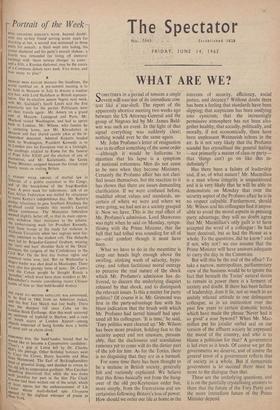WHAT ARE WE?
SOMETIMES in a period of tension a single event will soar out of its immediate con- - text like a star-shell. The report of the apparently abortive meeting two weeks ago between the US Attorney-General and the group of Negroes led by Mr. James Bald- win was such an event. In the light of that signal everything was suddenly clear; nothing would ever be the same again. Mr. John Prof umo's letter of resignation was in its effect something of the same order —although it would be ludicrous to maintain that his lapse is a symptom of national rottenness. Men do not cease to be men when they become Ministers. Certainly the Profumo affair has not clari- fied issues themselves, but the reaction to it has shown that there are issues demanding clarification. If we were confused before, muddled about values and standards, un- certain of where we were and where we were going, we had not as a society grasped it. Now we have This is the real effect of Mr. Profumo's admission. Lord Shawcross was right when he said on Monday, sympa- thising with the Prime Minister, that the bell that had tolled was sounding for all of us—cold comfort though it must have been.
What we have to do in the meantime is keep our heads high enough above the swirling, stinking wash of salacity, hypo- crisy, and (often factitious) moral outrage to perceive the real nature of the shock which Mr. Profumo's admission has de- livered, to discern the underlying disquiet released by that shock, and to distinguish the relevant issues. Is this a matter for party politics? Of course it is. Mr. Grimond was first in the party-advantage line with his blunt indication that the brush with which Mr. Prof umo had tarred himself had spat- tered all his colleagues. 'It is time,' he said, 'Tory politics were cleaned up.' Mr. Wilson has been more prudent, holding fast to the security aspect and not unaware, presum- ably, that the disclosures and scandalous rumours yet to come will do the dirtier part of the job for him. As for the Tories, there is no disguising that they are in a turmoil.
For some time there has been thought to be a malaise in British society, generally felt and variously explained. We believe that this flows basically not from the hang- over of the old pre-Keynesian order but, more simply, from the frustrations and un- certainties following Britain's loss of power. How should we order our life at home in the interests of security, efficiency, social justice, and decency? Without doubt there has been a feeling that standards have been slipping; that scepticism has been ossifying into cynicism; that the increasingly permissive atmosphere has not been alto- gether healthy; that socially, politically, and morally, if not economically, there have been unpleasant Weimarish echoes in the air. Is it not very likely that the Profumo scandal has crystallised the general feeling —not primarily a matter of class or party— that 'things can't go on like this in- definitely'?
Has there been a failure of leadership and, if so, of what nature? Mr. Macmillan is a man whose integrity is unquestioned and it is very likely that he will be able to demonstrate on Monday that over the security aspect of the Profumo affair he is in no respect culpable. Furthermore, should Mr. Wilson and his colleagues find it impos- sible to avoid the moral aspects in pressing party advantage, they will no doubt agree that Mr. Macmillan's only guilt is to have accepted the word of a colleague : he had been deceived, but so had the House as a whole. To the questions, did he know? and if not, why not? we can assume that the Prime Minister will have answers adequate to carry the day in the Commons.
But will this be the end of the affair? To take a narrow, metropolitan, parliamentary view of the business would be to ignore the fact that beneath the Tories' natural desire to remain in power there is a ferment of anxiety and doubt. If there has been failure of leadership, does it lie, not so much in an unduly relaxed attitude to one delinquent colleague, as in an inattention over the past few years to certain domestic trends which have made the phrase 'Never had it so good' a sour byword? When Mr. Mac- millan put his jocular verbal seal on our version of the affluent society he expressed the mood of the country, and who is to blame a politician for that? A government is led even as it leads. Of course we get the governments we deserve, and of course the general tenor of a government reflects that of society as a whole. But if democratic government is to succeed there must be more to the dialogue than that.
These are the underlying questions, and it is on the painfully crystallising answers to them that the future of the Tory Party and the more immediate future of the Prime Minister depend.


































 Previous page
Previous page